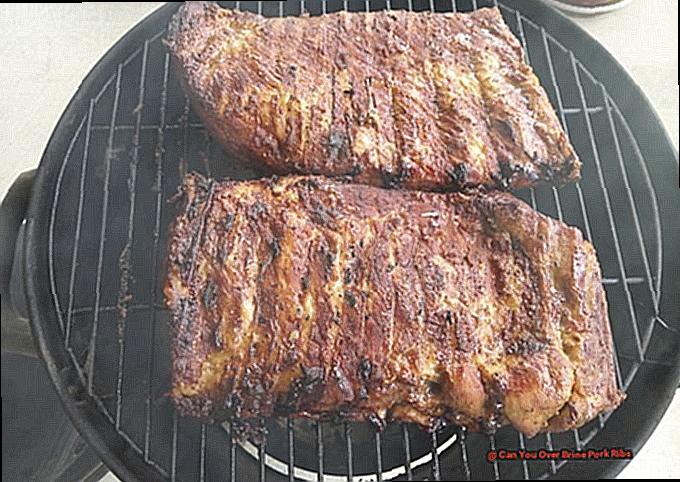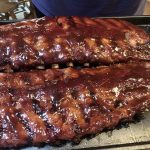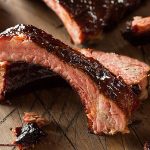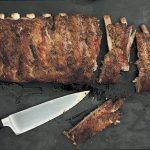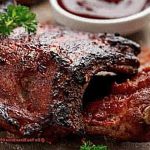Are you tired of sinking your teeth into dry and bland pork ribs? Have you tried brining them, only to end up with a salty and soggy mess? Trust me, I’ve been there. Brining is a popular technique used to infuse meats, like pork ribs, with tenderness and flavor.
But it’s easy to get carried away and over-brine, resulting in less-than-stellar results. In this blog post, we’ll be diving into the world of over-brining pork ribs – discussing common mistakes and sharing tips on how to avoid them.
Get ready to elevate your rib game with these juicy tidbits of information. Here’s what we’ll cover:
- What exactly is brining and why is it crucial for pork ribs?
- The consequences of going overboard with brining
- How can you tell if your ribs are over-brined?
- Helpful tips for preventing over-brining mishaps
- Alternative methods for achieving succulent and flavorful pork ribs
Contents
Ingredients Needed for a Basic Pork Rib Brine
The necessary components for a basic pork rib brine are water and salt, however, additional ingredients like sugar and seasonings can be incorporated for added flavor. Use pink salt sparingly as it is used to preserve the meat but can be dangerous in large amounts.
| Water | Salt | Brown sugar |
| Ice cubes | Optional: herbs, spices (garlic, onions) | Pink salt |
Other optional ingredients that can be included in a basic pork rib brine are herbs, spices like garlic and onions, and pink salt. These elements add depth and complexity to the taste of the ribs.
It is crucial to note that the amount of salt used in the brine should be carefully measured as too much can result in overly salty meat. A recommended ratio is 1 cup of salt per gallon of water.
When preparing a basic pork rib brine, it is best to use cold or ice water to maintain a safe temperature for the meat and prevent bacteria from growing. Keep the brine refrigerated while the ribs are soaking.
Overall, a basic pork rib brine is a straightforward yet effective method to enhance the tenderness, succulence, and flavor of BBQ ribs.
Steps to Brine For Ribs
Brining pork ribs involves the following steps: creating a brine solution, soaking the ribs in the solution for 8-24 hours, washing and drying the ribs, and allowing them to sit at room temperature before cooking.
It’s also a good idea to do a taste test to ensure that the flavor is well-balanced and not too salty.
Tips for ensuring maximum flavor infusion.
To avoid over-brining your pork ribs and achieve maximum flavor infusion, here are some helpful tips:
Measure salt accurately and use the right type
For every 4 cups of water in your brine solution, use 1 tablespoon of kosher salt. This will prevent oversalting of ribs. Choosing kosher salt over table salt is recommended for its mild taste and larger crystals, making it easier to measure accurately.
Limit brining time to 4 hours
While longer brining may result in more flavorful ribs, it also increases the risk of oversalting. To avoid this, limit brining time to a maximum of 4 hours.
Thoroughly rinse ribs after brining
After the ribs have been brined, it is crucial to rinse them thoroughly with fresh water. This will remove excess salt from the surface and prevent them from becoming too salty when cooked.
Taste before serving
Before serving your ribs, be sure to taste them to check for saltiness. If they are too salty, soak them in fresh water for a few minutes to reduce the saltiness.
Choose high-quality pork ribs
Opting for high-quality pork ribs can also help avoid over-brining. Poor quality ribs may already have a high salt content, making them more susceptible to becoming oversalted during brining.
By following these tips, you can ensure that your pork ribs have maximum flavor infusion without being oversalted.
Grilling Brined Ribs
Enhance the flavor and tenderness of grilled pork ribs by brining, but be mindful not to overdo it. Over-brining can result in excessively salty meat, ruining the overall taste of the ribs.
Brining has a significant impact on the grilling process for pork ribs by adding moisture to the meat. The saltwater solution used in brining breaks down proteins in the meat, allowing it to retain more moisture when cooked. This helps prevent the ribs from becoming dry and tough on the grill.
In addition to adding moisture, brining also boosts the flavor of pork ribs. The salt in the brine penetrates into the meat, enhancing its taste and making it more flavorful. To further enhance the flavor, you can also add herbs, spices, and sugar to the brine.
However, it is crucial to remember that over-brining can make pork ribs overly salty. As a general rule, it is recommended to limit brining time to no more than 4 hours. If left in the brine for too long, the ribs will absorb too much salt and become too salty when cooked.
To avoid over-brining, it is essential to accurately measure and use kosher salt instead of table salt. Since kosher salt has larger grains and less density compared to table salt, it is less likely to be over-applied.
If you accidentally over-brine your pork ribs, don’t worry. You can still save them by thoroughly rinsing them with water before grilling. This will help remove excess salt from the surface of the ribs.
In summary, brining is a great way to improve the grilling process for pork ribs by adding moisture and enhancing flavor. Just remember to follow proper measurements and time limits to avoid ending up with overly salty ribs.
FAQS about brining pork ribs
Brining is a method of soaking pork ribs in a solution of saltwater, resulting in more tender and juicy ribs. This process involves immersing the ribs in a combination of water, salt, and other seasonings for a specific amount of time prior to grilling. By allowing the ribs to absorb moisture and flavor, brining results in a succulent and flavorful end product.
Brining has a significant impact on the taste and texture of pork ribs. The salt in the brine triggers osmosis, where water is drawn into the meat, resulting in a moister final product. This makes the ribs more succulent and less likely to dry out during grilling. Additionally, brining also allows for the infusion of flavors into the meat, enhancing the overall flavor profile of barbecue ribs.
The longer the ribs are left in the brine, the more flavor they will absorb. The ingredients used in a brine can also be customized to suit personal preferences and create unique flavor combinations. For example, herbs, spices, sugars, or even fruit juices can be added to the brine for a more complex and personalized taste.
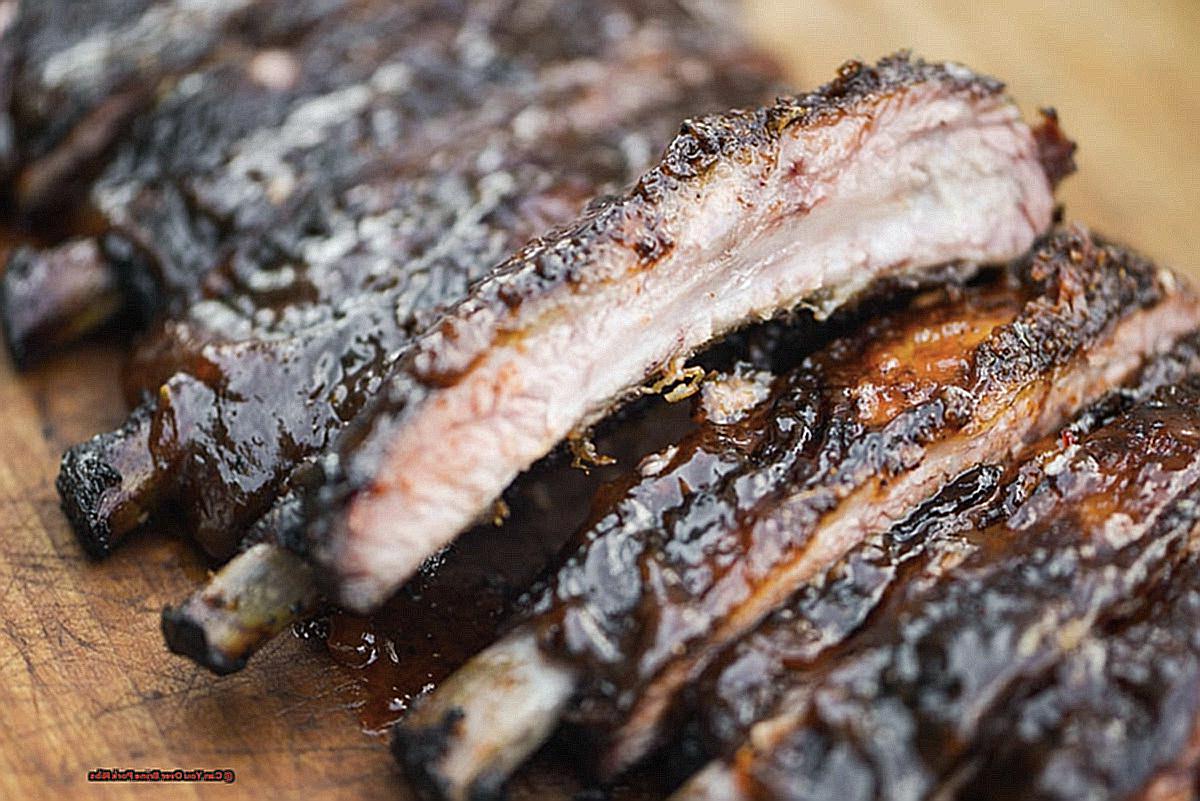
However, it is important to note that over-brining can lead to excessively salty ribs. Therefore, it is crucial to follow precise measurements and time limits when brining pork ribs. It is also essential to thoroughly rinse off any excess brine before grilling to avoid overly salty ribs.
Patience and precision are key when it comes to grilling brined ribs. It is vital to cook them evenly and at the correct temperature to preserve their tenderness and flavor. After grilling, it is important to allow the ribs to rest before cutting into them so that the juices can redistribute.
Conclusion
In conclusion, brining is a fantastic technique for elevating the tenderness and flavor of pork ribs. However, it’s important to be cautious of over-brining, as it can lead to overly salty and unappetizing ribs.
To avoid this pitfall, precision is key. Accurately measuring your ingredients and limiting brining time to no more than 4 hours will help ensure perfectly seasoned ribs.
Thoroughly rinsing the ribs after brining and taste-testing before serving can also prevent oversalting mishaps. Additionally, opting for high-quality ribs and using kosher salt instead of table salt can make a significant difference in achieving succulent and flavorful results.
While not essential for BBQ pork ribs, brining can greatly enhance their moisture and taste when done correctly.
So go ahead and experiment with different brine variations incorporating herbs, spices, sugars, or fruit juices to create unique flavor combinations.
Just remember to have patience and precision when grilling the brined ribs to preserve their quality.

